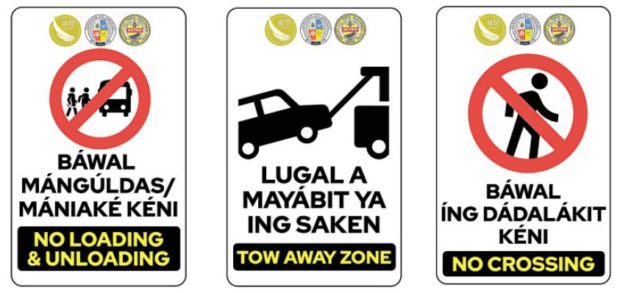
‘KABALEN’ ON THE ROAD Samples of the signs motorists can expect—and must obey—on the streets of Angeles City starting this September. —CONTRIBUTED PHOTOS
ANGELES CITY, Pampanga, Philipines — “Bawal Paparada Keni” (No Parking), “Lugal A Mayabit Ya Ing Saken” (Tow Away Zone), “Mamye Dalan” (Give Way).
Come September, this city in Pampanga province will have traffic signs like these, written in both English and Kapampangan, as a way to save the local language from being forgotten.
Some 300 signboards will be produced for at least 21 regulatory, warning, and guide signs that have been translated in the native language, Reina Bella Manuel, executive assistant of Mayor Carmelo Lazatin Jr., told the Inquirer in a phone interview on Wednesday.
These will be put up beside English signboards dotting the city’s 20-kilometer stretch of the Manila North Road (MacArthur Highway) and the 8-km Filipino-American Friendship Circumferential Road, Manuel said.
The English signboards follow those prescribed by the Land Transportation Office (LTO). Local traffic enforcers are authorized by the LTO to enforce road rules, said Manuel.
“Like violations of English signages, those going against traffic rules in Kapampangan face the same penalties imposed through an ordinance,’’ she said.
Lazatin said localizing the traffic signboards complied with Ordinance No. 424, a local law “establishing Kapampangan as an official language of Angeles City and institutionalizing its use in all sectors alongside existing national and official languages.’’
Drafted by language advocate Michael Pangilinan and sponsored by Councilor Amos Rivera, the ordinance was approved by then-Mayor Edgardo Pamintuan in November 2017.
‘Highly threatened’
According to the ordinance, Kapampangan is “highly threatened” although it is the seventh-largest major language spoken in the country.
The Kapampangan language is mostly spoken in Central Luzon provinces, including Pampanga, and some towns of Bataan, Tarlac, Bulacan, and Nueva Ecija. It is used by more than two million native speakers.
Older generations call the native language “Amanung Sisuan” (language suckled from the mother’s breast).
Translations were made by the Kapampangan Language Services Unit and tourism office, and reviewed by local anthropologist Joel Mallari.
Lazatin said Kapampangan should be preserved and promoted by using it in writing and in conversations, even in messages on social media.
The city council has been holding its sessions in the local language at least once a month since January, according to Vice Mayor Vicenta Vega-Cabigting.
Medium of instruction
Since February, the council has drafted four resolutions in Kapampangan.
Teachers in at least 76 daycare centers have also been instructed by Lazatin to use it as a medium of instruction three hours weekly once in-person classes resume.
The city government’s news program “Serbisyong May Puso” (service with a heart) uses Kapampangan in on-cam reporting.
Lazatin has requested local media entities to raise awareness on the language to “help the younger generation of Kapampangans carry the city’s culture and language.”
Department of Education Order No. 74 Series of 2009 (Mother Tongue-based Multilingual Education) and section 5-F of Republic Act 10533 (K-12 Law) encourage the use of Kapampangan in official school gatherings, meetings, programs, and celebrations.